As millions of people starved to death and the Stalinist purges swept the country, they basked in luxury. They attended sumptuous balls, wore gorgeous dresses, had expensive jewels and elegant villas, and lived like princesses. But they could lose everything at any moment.
USSR celebrities were wives of high-ranking dignitaries or stars of cinema or theater. They often owed the protection of the general secretary himself to their husbands or lovers. Sometimes, however, they managed to captivate even Stalin and become almost inviolable. Few have managed to keep these considerations for longer.
Long live the ball!
The women associated with the Soviet elite shone in the company like real stars. In stylish dresses, they shone in salons like aristocrats under tsarist Russia.
The balls were organized, among others, by the wife of the famous "bloody dwarf", Yevgeny Yezhov, a guardian and lover of writers, and a vain and capricious woman. The same celebrities of the time attracted to her salon. Few could afford to turn down her promotions, and she changed lovers like gloves.
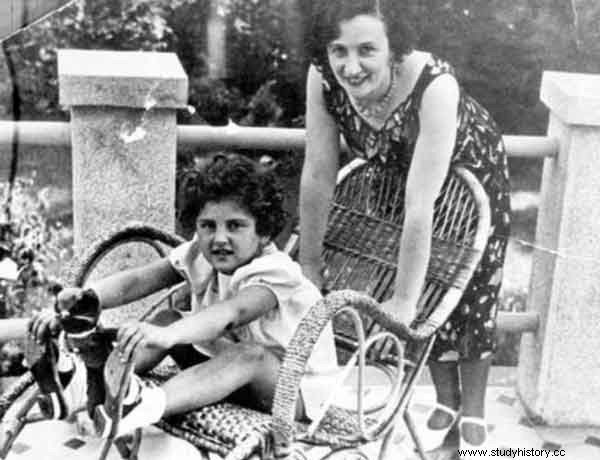
Vain, capricious and dissolute. Yevgeny Yezhov in the photo with his adopted daughter Natasha in the 1930s (source:public domain).
Agness Mironov described the famous party events in her memoirs "Wife of the NKVD". When she and her husband were invited to the New Year's Eve ball at the Kremlin in 1938, she had to apply herself to her image: There will be only party ladies there, you have to look like a "blue stocking" , put on a stiff suit, God forbid, to show the shoulders or the neck! She also described the New Year's Eve ball itself:
Stalin was sitting at the back of the room at a wide table. Opposite Stalin, at the same table, sat Molotov's wife, Zemchizhyn, and other ladies of the party, all in dark blue costumes and dresses that differed only in shades. Servants brought us various things - one caviar, another sturgeon, a third hot skewers, and other dishes. The dishes were sophisticated, varied, mostly spicy Caucasian cuisine, but there was also a lot of other things. The tables were laden with wine.
Her husband, Sergei, as a reward for his faithful service, became the head of the NKVD for the whole of Western Siberia, and then a representative of the secret police in Mongolia. Their streak was soon to end and even she did not escape the labor camp.
Beria in the Black Volga
The Stalinist elite also consisted of film and theater stars and singers. The beautiful Galia Jegorowa was a controversial film actress, known for her numerous romances and spicy creations. As the wife of one of the commanders of the Red Army, she enjoyed luxury. It made an impression on Stalin himself. Nevertheless, she was arrested and for "visiting foreign embassies" sent to a firing squad.
Galia was friends with Olga Budyonny, a singer of the famous Bolshoi Theater, and the wife of Marshal Semyon Budyonny, cherished by Stalin. Olga ended up senseless in solitary.
The beautiful actress Tatiana Okuniewska, who hoped that marriage with a famous writer and journalist would save her from arrest, was also unlucky. At first, she lived a luxurious life with her husband and attended Kremlin balls, but there she caught the attention of the then head of the NKVD, Lavrenty Beria. After forty years, she told in one of the TV interviews how Beria was waiting for her in front of the theater:
I noticed the black limo as soon as I left the theater. An NKVD colonel got out and nodded at me. As I approached, he grabbed the back of my head and pushed me into the car so that I fell face down onto the passenger's lap - it was Beria.
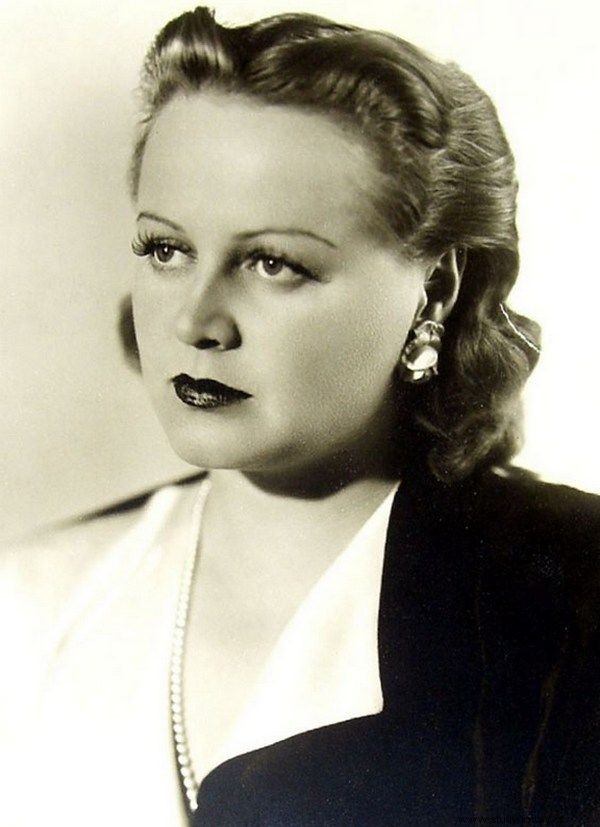
Neither her acting career nor her husband's high position saved Tatiana Okuniewska from landing in the Black Volga (source:public domain).
The NKVD quickly determined that her brother and father were in prison and that they might be transported to a labor camp and even executed. The actress heard that she could help them, as long as she arranged it with Beria. She was raped multiple times and her husband did nothing to protect her. He was just promoted to the Central Committee and didn't want to risk himself.
Conquered luxuries and non-Soviet whims
Other celebrities at the time were more fortunate. Beautiful Luba Ivanova, the star of the Mieżrabpomfilmu studio, wore only the most expensive creations and had a huge collection of jewelry. She left her husband for the boss of her label, Boris Babicki, with whom she lived first at his dacha in Kratow near Moscow, and later in the spacious apartment of the Lux Hotel owned by the Comintern in the very center of Moscow.
The furnishings, including leather armchairs, Persian carpets, valuable antiques and other ornaments, came from property received by the NKVD of the old Russian aristocracy and bourgeoisie. Luba's daughter recalled the house she grew up in: It was like a palace, a museum, a fairy tale. Mum was very proud of her acquisitions and liked to tell us the story of each piece of furniture.
Also Lidia Andreevna Ruslanova, a famous Soviet singer. she was the capricious diva of her time. Initially, Stalin was delighted with her, but he changed his mind when she refused to go to the front, motivated by concern for her voice. She did not want to sing for the soldiers because she was afraid of catching a cold. A scandal ensued and Stalin was furious. His words are quoted in his memoirs by Lyubov Orlova:
- People are fighting and the frost doesn't bother them! And it turns out, it bothers someone! Does anyone make her sing in the cold? And even in the cold? Why can some people fight in the cold, while others are afraid to open their mouths? Soviet people don't do that!
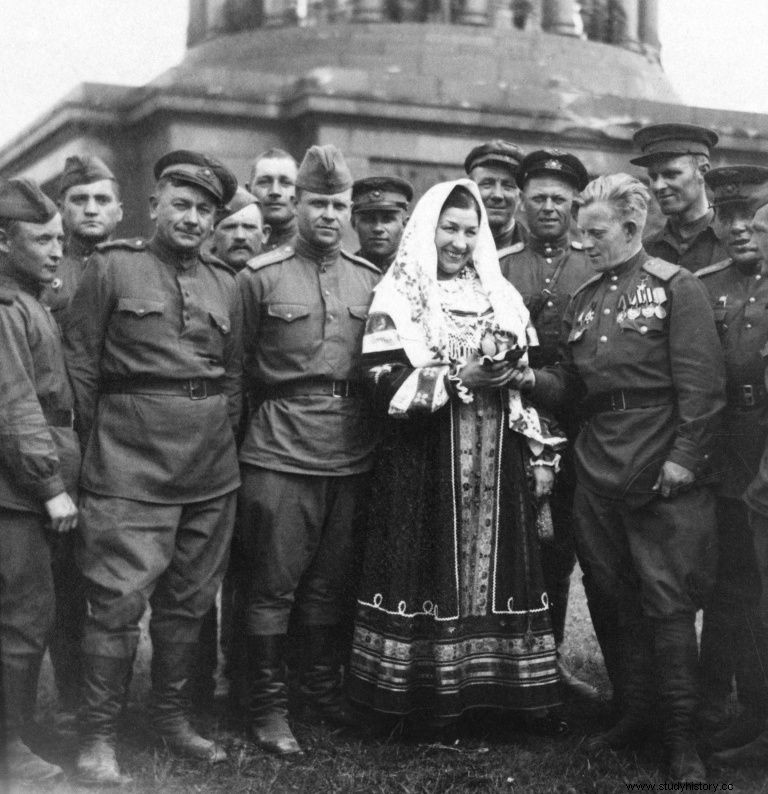
Lidia Andreevna Ruslanova did not want to sing for the dwarves fighting in the cold, but posing with the victorious soldiers in conquered Berlin is something completely different ... (source:public domain).
Lydia was not only vain, but also loved to surround herself with ostentatious luxury. It was buzzing with rumors about the riches she had accumulated. After the war, she and her husband were brought to trial for the appropriation of captured goods.
There were also very troublesome celebrities in the USSR, whose terrible nature, lack of good manners and bad habits could spoil the most successful party. One of the pre-war actresses, popular and awarded with a state order and two Stalin prizes, reportedly was more than her career busy speculating and spreading nasty rumors.
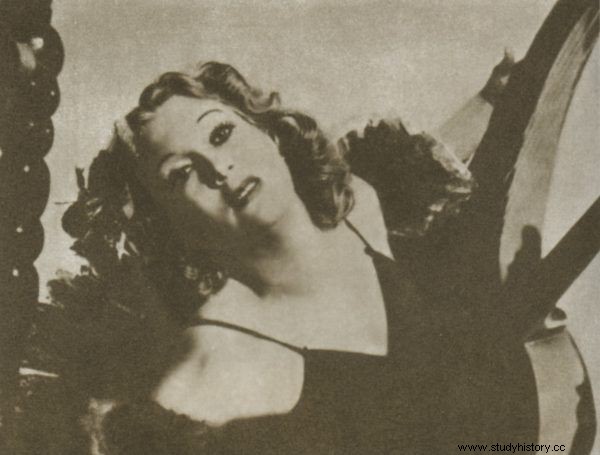
Beautiful and extremely sexy, Lyubov Orlov, became Stalin's favorite for many years and never ceased to enjoy his favor. Here the actress plays the role of the artist Szatrowa in the film "Spring". The photo is from the book "I loved Stalin" (Bellona 2016).
Impudent, greedy and vulgar, and a drunkard, she used the hospitality and friendship of others. In the end, she exaggerated, trying in company to make herself a wronged lover of Stalin. As we read in the memoirs of Lubow Orłowa, who was clearly unfavorable to her:
So it's evening, the party is in full swing. The actress I am telling you about, already drunk. And how can it be otherwise, if you drink vodka not with a glass but with a wine glass and demands to be poured to the brim every time?
Stalin's lover and pet
Stalin's favorite actress, the already mentioned Lyubov Petrovna Orlov, also lived in luxury. Together with her second husband, director Grigory Aleksandrov, she belonged to the narrow circle of artists cherished by the USSR.
Orlov in her memoirs titled "I loved Stalin", confirmed the rumors about their romance. And apparently she was not the only one. Molotov claimed that women were in love with him, as evidenced by a large collection of adoring letters and numerous flirting if not the chief's love affairs.
But it was different with Orłowa. This beautiful actress caught Stalin's attention and kept his favors for many years. During Kremlin parties, she always sat close to the leader, and he distinguished her with conversations and compliments. He protected her and did not allow harm to the NKVD or the envious actors.
And the environment hated her, accusing her of alcoholism and calling her a dissolved diva. Her refined style also did not arouse approval. In July 1938, one of the opinion-forming magazines, "Sovietskoje iskusstwo", branded her with an article entitled "Ungodly behavior". In addition, her roles aroused outrage. What was it showing on the screen?
In her book Sex versus the USSR, Olga Jerafiejenka emphasizes the sexual asceticism that prevailed in Soviet society. Orłowa was a symbol of the sex of those times, and her screen creations were full of eroticism, which was scorned at the time. Her dance in a tight leotard from the film "Circus" (1936) is considered one of the boldest episodes in the history of the then Soviet cinema.
A capricious diva or a modest artist?
Certainly Orłowa was close not only to the sex bomb, but also to the diva. The team was able to replace the curtains in Orłowa's hotel rooms with thick and dark ones, explaining it with her oversensitivity to light, and she demanded wages several times higher than those generally considered sufficient, but she rarely sparkled in company.
I did not visit all sorts of Kremlin parties very often - she wrote in her autobiography "I loved Stalin". Considering herself to be modest, she criticized haughty industry colleagues who made themselves big stars:
A Soviet man with such behavior is not good for the face. A journalist has come to see you, so you'd better spend a few minutes with him. After all, he is at work, he wants to write about you for the Soviet people. But no, the journalist is sent away, and they themselves will discuss the beaten hour about how short of time they are.
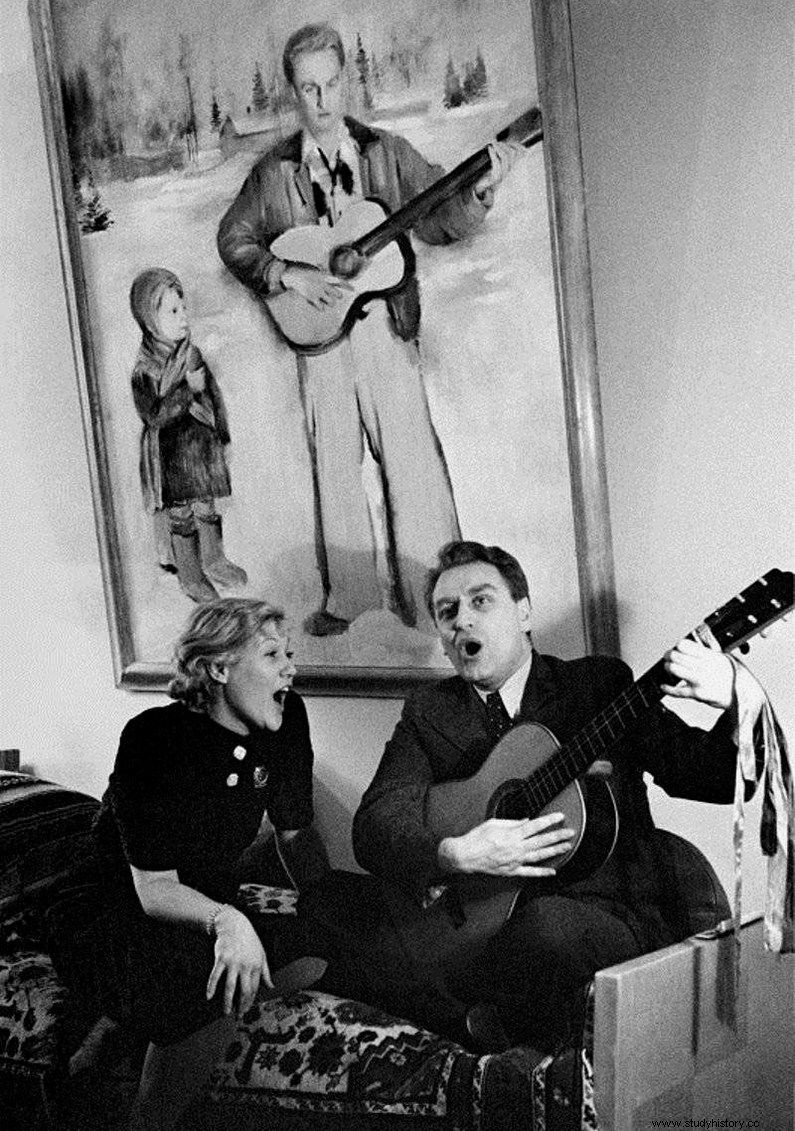
Lyubov Orlova liked to portray herself as a person whose soda water never hit her head. The photo shows how she sings with her husband, director Grigory Aleksandrov (source:public domain).
On the other hand, Orłowa's friends could not get over the artist's private villa built in Wnukov near Moscow, which was supposed to resemble Hollywood mansions rather than Soviet dachas. The star described in her memoirs that she had built it with her husband, and Stalin had a grudge against her:
- And why did you start building the cottage yourself? Write your application. A distinguished Soviet director and a distinguished Soviet actress are entitled to a state dacha.
- Thank you, Josif Wissarionowicz - I replied. - But we have many more deserving people than a dacha. If we have the opportunity to build a dacha on our own, then we should build, not ask from the state. It is enough for us that the state has given us a plot for construction. Consumption trends must not be supported, but eradicated.
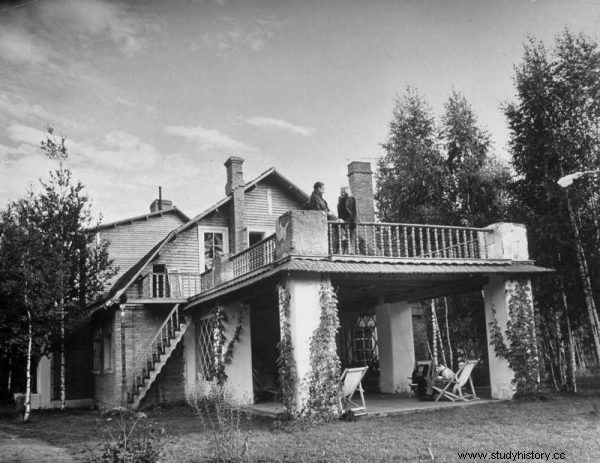
Journalists could not especially get over the private dacha that the actress and her husband had in Wnukov, near Moscow. In the photo, Lyubov and Grigory are talking on the terrace of their suburban villa. The photo is from the book "I loved Stalin" (Bellona 2016).
Interestingly, Orłowa's position, due to Stalin's sympathy and protection, gave her many more opportunities. For example, she could travel abroad, which was both a luxury unavailable at the time and an expression of great trust on the part of the authorities.
Even the most absurd requests were taken into account. According to an anecdote, when in 1943 she called one of the headquarters asking for help in evacuating a close friend from Stalingrad and was refused, she asked if she should have contacted the Kremlin immediately. She immediately received not only a transport plane, but also fighter protection.
Regardless of the truth of the story, Orlova - unlike other celebrities of the USSR - never fell out of favor with Stalin and lived to see her luxury years.
